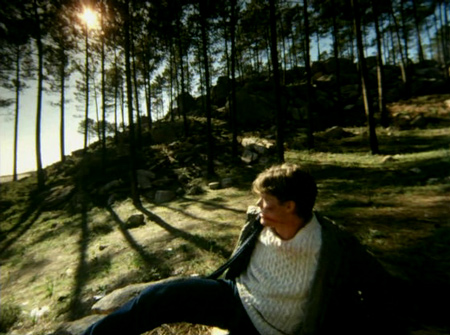Requiescat in pace, you wonderful man.

The Territory (1981)
Ruiz is tougher to peg down than most filmmakers. Certainly he seems to be interested in unusual narratives, or conventional narratives made complicated, often by the surreal. I get the impression he likes to spin his films, and his joy is in the spinning. He investigates, but it’s often (always?) beside the point that he find answers, if he does. Whether all this is an accurate pigeonholing of an artist who rather seems to avoid just that, I don’t know as of yet. So what is The Territory? It’s not much of an investigation, but there are signs and symbols, and some mystery. As for its narrative, it’s a linear progression of events deranged skillfully by its surrealism. Considering the stagnant nature of the premise, in which our hikers become desperately lost inside a sort-of metaphysical forest, the film appropriately (and maybe at times tryingly) stagnates as well. By this I mean it formally compliments, or should I say it accentuates, the maddening dead-endedness of the situation. The situation itself is harder to discern. Maybe there’s nothing supernatural about the forest and their forever searching a way out follows The Discreet Charm of the Bourgeoisie‘s endless road to finding somewhere to eat. Thus, it may simply be a narrative ploy to mount this bizarre tale of group dynamics and human morals in disarray. The aesthetic becomes poisoned over time with colourful overlays further removing us from the comparatively sane (but still unsettling) first act. The acting must be mentioned. It’s just as odd as anything else in the movie. It’s certainly “bad” in the traditional sense, but it’s also so, so right. What’s striking is that one of the actresses delivers a genuinely great and unexpected monologue towards the end full of insecure nuance. Ultimately, I’m still not sure what The Territory is about, but I liked whatever it was.

City of Pirates (1983)
Even more surreal than The Territory, this picture certainly possesses a larger focus on imagery than that film, and to my mind (and eyes) is more creative and rewarding in that respect. There are some really playful, perplexing compositions throughout. There is one scene largely made up of shots with objects in the extreme foreground, countering a figure at a different depth. It’s unrelentingly composed. The shots don’t so much support the drama as they are just surreal to be surreal. It’s probably fruitless searching for meaning in a surrealist work, that is to say inferred intentional meaning, so it’s more a matter of enjoying the ride. Which I did. Not exponentially so, as is usually the case with me and surrealism, but I certainly appreciated its oddities and filmmaking. The score, too, is worth noting. As with that of The Territory, the music works in an ironic fashion not unlike, for instance, the way Godard uses scores. Though in Contempt for example Godard stops and starts the music, Ruiz here repeats and repeats it in a way that could hardly be considered synchronised to the dramatic energy, and thus does not work as a traditional score does. The cast is not on the B-level of the previous film and is generally strong, including a young Melvil Poupaud and a woman who looks like Rebecca Hall. Delightfully and mesmerisingly difficult to make sense of.

Genealogies of a Crime (1997)
Less surreal than earlier Ruiz films, Genealogies of a Crime is nonetheless rife with the unusual, formal trickery, motifs, and total ambiguity. It has enough regular plotting almost to resemble the Hollywood neo-noirs and psychological investigative dramas of the time, but where those predictably make a big deal of the case facts, twists and turns, and reach logical conclusions, Ruiz’s film playfully spins along with disregard for clarity, and in fact adds more ideas as it progresses. It’s brought up at one point that Deneuve’s lawyer character has difficulty choosing between objects in front of her, and this makes for a remarkable scene in which Ruiz contrives objects jarringly into the mise-en-scene not unlike those shots in City of Pirates. But until the end of this, she is not choosing -we are. The people and the innocuous objects are emphasised equally and our gaze is split and at unease. Similarly, the scenes in which she and the accused murderer roleplay, one as the other, are a psychological jumble of revealed meaning and are difficult to keep up with; more unease. Things are further complicated by the parable narrated to us initially, so we look for parallels, and the idea of the geneology of stories, tales that can shape our life narrative, be inherited somehow. The aforementioned parable shapes the film proper, just as Deneuve’s lawyer mirrors the murder victim (also played by Deneuve), as presented through flashback. It’s all very abstract and seductive and requires more viewings. Damn good.
December 2010
